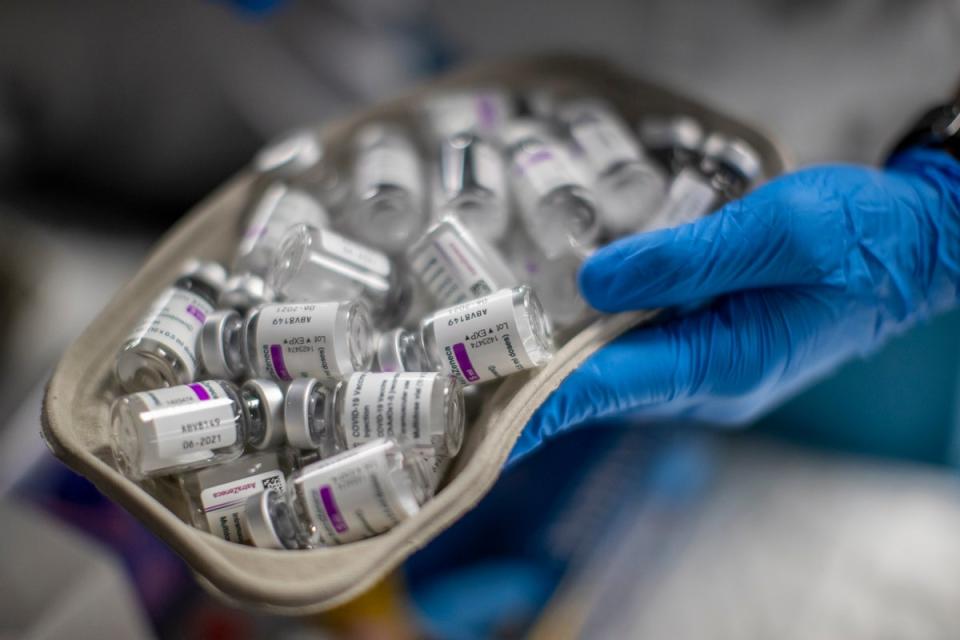What are the health concerns over AstraZeneca’s Covid vaccine as jab withdrawn?
More than three years since AstraZeneca created its lifesaving Covid-19 vaccine, the pharmaceutical company has withdrawn the jab worldwide.
Once hailed by former prime minister Boris Johnson as a “triumph for British science”, the jab is thought to have saved six million lives with its creation during the pandemic.
Citing purely commercial reasons for the withdrawal, the company said the vaccine had been superseded by a “surplus of available updated vaccines”.
The company also said it would withdraw the marketing authorisations of the vaccine - now known under its new name Vaxzevria - within Europe.
The firm’s withdrawal application came into effect on Tuesday, months after the Anglo-Swedish drugmaker admitted in court documents for the first time that the vaccine causes side effects such as blood clots and low blood platelet counts.
As the Oxford/AstraZeneca Covid-19 jab is discontinued, here’s everything we know about it.

What is the jab?
AstraZeneca’s vaccine was developed in collaboration with Oxford University and produced by the Serum Institute of India.
The vaccine was first approved for use in the UK in December 2020 and the first vaccination outside of a trial was administered on 4 January 2021.
It was widely administered in over 150 countries and is thought to have saved six million lives.
Some studies conducted during the pandemic found the vaccine was 60 to 80 per cent effective in protecting against the novel coronavirus.
Why does AstraZeneca say the jab has been withdrawn?
AstraZeneca said on Tuesday it had initiated the worldwide withdrawal of its Covid-19 vaccine due to a “surplus of available updated vaccines” since the pandemic.
The company also said it would proceed to withdraw the vaccine Vaxzevria’s marketing authorizations within Europe.
“As multiple, variant Covid-19 vaccines have since been developed there is a surplus of available updated vaccines,” the company said, adding that this had led to a decline in demand for Vaxzevria, which is no longer being manufactured or supplied.
The firm’s application to withdraw the vaccine was made on 5 March and came into effect on 7 May, according to The Telegraph, which first reported the development.
The firm began moving into respiratory syncytial virus vaccines and obesity drugs through several deals last year after a slowdown in growth as Covid-19 medicine sales declined.
Are there health concerns?
AstraZeneca recently admitted in court documents that its vaccine could cause very rare side effects like blood clots and low blood platelet counts.
The admission came after the company was slapped with a class action lawsuit in the UK which claimed that the vaccine had caused deaths and severe injuries and sought damages up to £100m for about 50 victims.
“It is admitted that the AZ vaccine can, in very rare cases, cause TTS. The causal mechanism is not known,” AstraZeneca said in court documents in February, The Telegraph reported.
Thrombosis with Thrombocytopenia Syndrome (TTS) can cause potentially fatal blood clots due to low blood platelet counts in humans.

One of the people who died after having the vaccine was BBC Radio Newcastle presenter Lisa Shaw, who had her first jab in May 2021 and died just a week later.
In August of that year, Newcastle coroner Karen Dilks ruled the 44-year-old had died from a rare condition associated with the jab that induces swelling and bleeding on the brain, “vaccine-induced thrombotic thrombocytopenia”.
AstraZeneca’s admission that the vaccine could potentially prove lethal ran counter to its insistence in 2023 that it would “not accept that TTS is caused by the vaccine at a generic level”.
The World Health Organization also confirmed that the vaccine could have fatal side effects, saying in a statement: “A very rare adverse event called Thrombosis with Thrombocytopenia Syndrome, involving unusual and severe blood clotting events associated with low platelet counts, has been reported after vaccination with this vaccine.”


